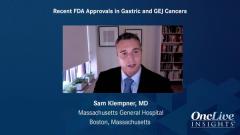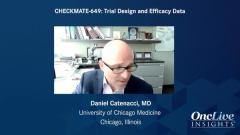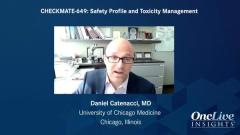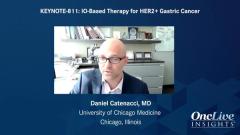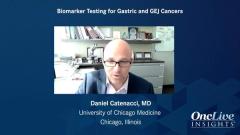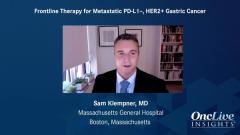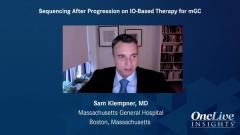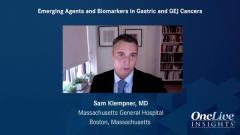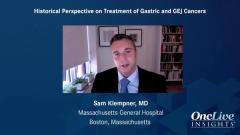
CHECKMATE649: Safety Profile and Toxicity Management
Thought leaders in gastric and GEJ cancers review safety outcomes from the CHECKMATE649 trial presented at the 2021 ASCO annual meeting.
Episodes in this series

Daniel Catenacci, MD: What’s the safety profile of Nivo [nivolumab] plus chemotherapy, and why does it matter? Why not give everyone this drug just in case, I guess would be counterargument?
Sam Klempner, MD: We have to ask ourselves, are we adding anything beyond toxicity in someone with a PD-L1–negative tumor? At least the data, in my interpretation, may point to a no. There was a higher rate of toxicity in the experimental arm. Some of them are mild, but some of them are clinically meaningful. If you investigate the rates of toxicity, even grade 1 and 2, that led to discontinuation of study treatment, it’s higher. I was looking at this not that long ago, and the grade 3 events that led to discontinuation were almost double in the chemotherapy, Nivo [nivolumab] arm as opposed to the chemotherapy alone arm. We know, of course, from a vast experience of PD-1 agents, that these are not completely benign drugs, and chemotherapy doesn’t mitigate the [adverse] effects. It doesn’t seem to potentiate them, but you’re giving a regimen that has its own [adverse] effect profile in chemotherapy, and then an agent that has a potential real toxicity profile that can impact a patient’s quality of life and symptoms. And in a palliative setting, we owe it to the patients to try to strike that balance. But I’d certainly be interested to hear your thoughts on the same question about the toxicity profile, and then we can lead into discussing the same aspects of the KEYNOTE-811 data.
Daniel Catenacci, MD: I wholeheartedly agree you. In the report originally it was 15% higher grade 3 or higher toxicity in the Nivo [nivolumab] arm compared to chemotherapy alone. Then you mentioned grade 1 and 2 as also higher, and those are often underappreciated, but they’re real. We’d want to make sure we’re giving it to somebody who has a chance to derive benefit. Maybe this will come up later as new drugs come on the horizon that we’re going to talk about, when there will be other choices too for these patients who have low level PD-L1. When we start talking about, maybe claudin if those studies hit, or bemarituzumab for FGFR2. We’re going to be faced with decisions, which is great. We’ve gone from no choices, with just chemotherapy, to now we have a whole bunch of choices, but we’ve got to give them the best choice. I would start with PD-L1 lows, they could have other better options, in addition to sparing them from toxicity that’s not necessary in the setting of where we see that they don’t derive much benefit. I would also ask, from my perspective the counterargument to this, though, is that even though OS [overall survival] has not improved, PFS [progression-free survival] is not improved, they did point out at ASCO [American Society of Clinical Oncology annual meeting] 2021 that there was an increase in response rate in these groups. Single digit, not statistically significant in hundreds of patients in these cohorts, and they’ve argued that that’s clinically meaningful. I would argue not. It’s single digit, and it’s not statistically significant, and it doesn’t translate to a survival benefit. I’d love to hear your opinion on that. But for me, I don’t think that’s enough frankly to give all-comers this agent.
Sam Klempner, MD: I think we share the same thoughts here. It’s hard to go against the grain when there’s inertia to give I-O [immunotherapy], and some people have tried to formally study this question. We have to be true to the data in this situation, and I agree. I’m not convinced that I’m helping someone with a CPS [combined positive score] negative tumor, and certainly there are nuances to CPS testing and scoring, and I know you’ve done some work on this topic both temporally and spatially. That’s irrelevant, but a negative tumor, which is what the entry criteria were based on, a single biopsy. It’s not like they assess multiple biopsies and pick the highest. It’s still relevant.
Daniel Catenacci, MD: Before we move on, one other thing to note is that as we pointed out, this study has a third arm for which we await to see the results. It’s a chemotherapy-free arm of Nivo, Ipi [nivolumab, ipilimumab], and maybe we can predict what it might show because we’ve seen the Nivo, Ipi [nivolumab, ipilimumab] arm of CheckMate 648 at ASCO this year, which was the same study design but for squamous cells. It’s as one might predict, with this crossing of the curves business or yin yang phenomenon that we saw with all the other monotherapy checkpoint studies without chemotherapy in first, second, and third line. What do you think? Do you think that’s going to show something similar, some sort of initial detriment and then other patients at the other side showing some benefit?
Sam Klempner, MD: Yes, I would. There are higher rates of earlier drop-off and generally lower response rates to an I-O, I-O combination as opposed to I-O, chemotherapy that certainly account for some of that. I think in CheckMate 648, if I recall, the response rate was like 35% vs 50% for the I-O, I-O vs chemotherapy plus I-O. My take home from that was, there are 2 ways you can interpret it, but mine was that Ipi, Nivo [ipilimumab, nivolumab] doesn’t add much vs chemotherapy, Nivo [nivolumab].
Daniel Catenacci, MD: Absolutely. We’ll see what those data show, but that’s something to point out, that that part of the study remains outstanding.
TRANSCRIPT EDITED FOR CLARITY


